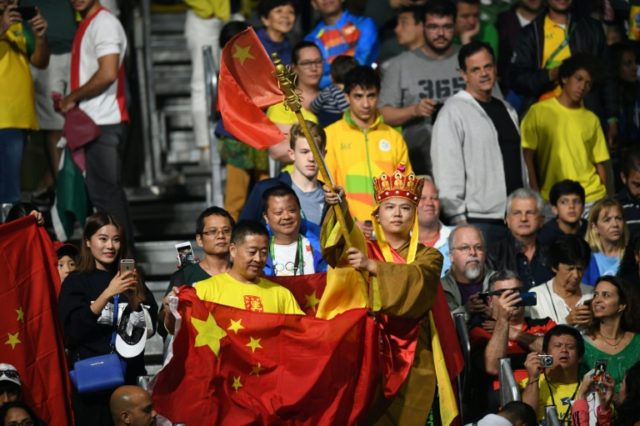Beijing (AFP) – China has so far failed to dominate the Rio medal table in the way it did in London or Beijing — so fans and media have decided there’s more that glitters about the Olympics than gold.
After a disappointing start — China failed to win a first-day gold for the first time in 16 years — supporters and officials have sought to dampen expectations, eight years after crushing the competition on home turf.
At the end of the sixth day of competition in Brazil, China had accumulated just 11 golds and eight silvers, well behind the US on 16 golds and 12 silvers. At the same point in London 2012, China was on top of the medal table with 18 golds and 11 silvers.
But instead of bemoaning the gap or slamming athletes for disappointing results in the country’s traditional strengths of shooting, gymnastics and diving, Chinese media have decided that if you can’t beat them, best to argue that it doesn’t count.
“Medals are not the be-all and end-all of the Olympics”, ran the headline on a China Daily editorial, adding that a “majority” of Chinese fans were learning to enjoy sports as sports rather than a contest for national pride.
“Of course, we want to see our athletes win as many medals as possible, gold medals in particular. But we should applaud and enjoy the achievements of all our sportsmen and women as long as they have tried their best.”
It is a remarkable about-turn from days past when China’s government saw gold as a proxy for national glory and handed out cars, apartments and cash to champions.
Sporting officials were once evaluated by how many golds their athletes won at Olympic and regional games, while athletes who failed to bring home first prize cried and apologised publicly for disappointing the motherland.
But in the state-run Global Times, often a hotbed of nationalist sentiment, an op-ed argued that while the Chinese team was unlikely to win as many medals as in Beijing or London, that “doesn’t matter now, because Chinese people’s confidence doesn’t need medals as evidence anymore”.
– Pleased with bronze –
The shift in Olympic attitudes comes as China’s growing middle-class becomes less willing to send young children to gruelling sports academies in the remote hopes of winning gold.
Stories of former champions reduced to begging in subways or serving as bathroom attendants have shocked Chinese parents, raising questions about whether sending their children to train is worth the risk.
The meagre fortunes of some one-time Olympic stars is in part because athletes face limits on what kind of sponsorships they can accept, with many obliged to share revenue with the government.
Many question the country’s investment in a sporting system aimed at boosting medal counts, with China’s General Administration of Sport boasting a 2016 budget of 3.24 billion yuan ($500 million), according to its website.
But when star swimmer Ning Zetao, 23, a fan favourite after winning the world championships last year, failed to qualify for the 100m freestyle final, he still received adulatory praise in state media for his efforts.
A column in the official Xinhua news service praised fans who “have overcome their narrow-minded fetish over gold medals”.
Instead, the biggest Chinese star of Rio is a bronze medallist, the goofy and charming 20-year-old swimmer Fu Yuanhui.
Her unabashedly overjoyed response to first swimming a personal best in the semi-final, then coming joint third in the final, endeared her to millions.
She did not even realise either fact until told by an interviewer, and when she learned that she missed out on silver by 0.01 seconds, joked that it could be because she had “short arms”.
“She was funny and lively and people around the world loved that. It’s completely turning the Chinese robot stereotype on its head,” Mark Dreyer, editor of website China Sports Insider, told AFP.
Fu’s winsome facial expressions inspired emoticons and went viral online, adding 4.9 million followers to her microblog.
“This is a major departure from the previous generation of lachrymose Chinese athletes who would easily tear up at the first note of the national anthem, or by failing to live up to the entire nation’s expectations,” said a commentary in Shanghai Daily.

COMMENTS
Please let us know if you're having issues with commenting.